Thomas James Richards, Diaries, Transcript Vol. 2 - Part 5
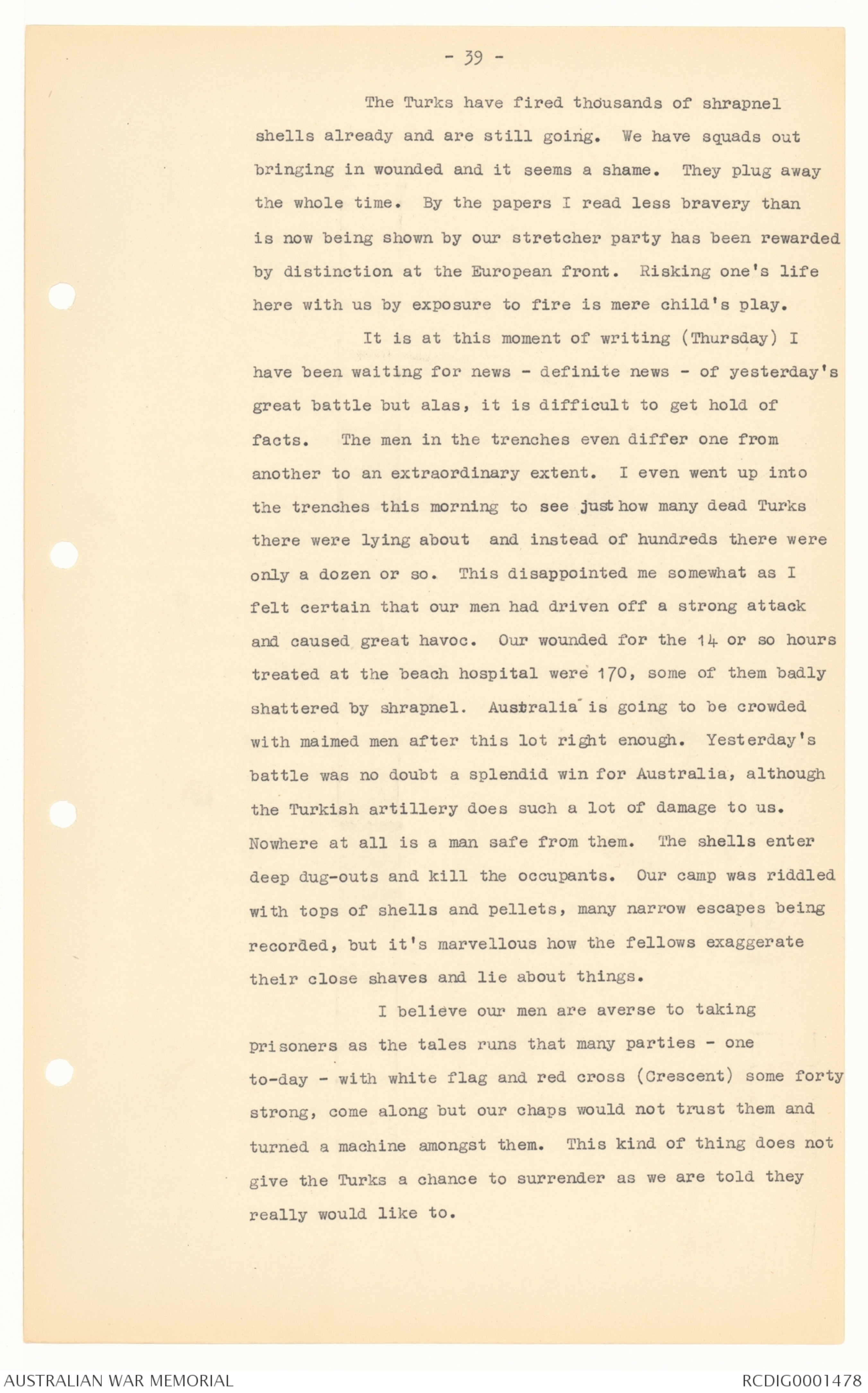
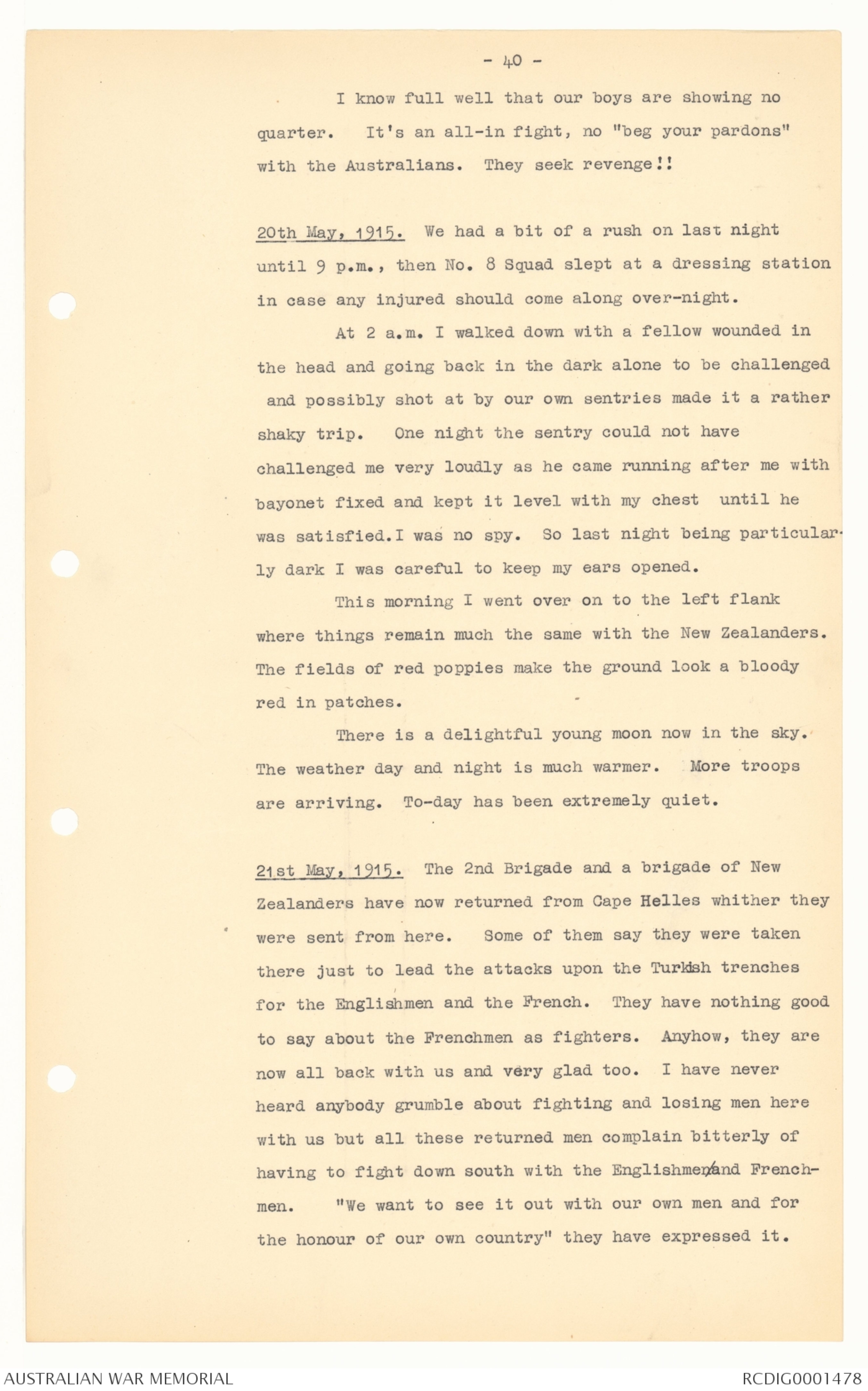
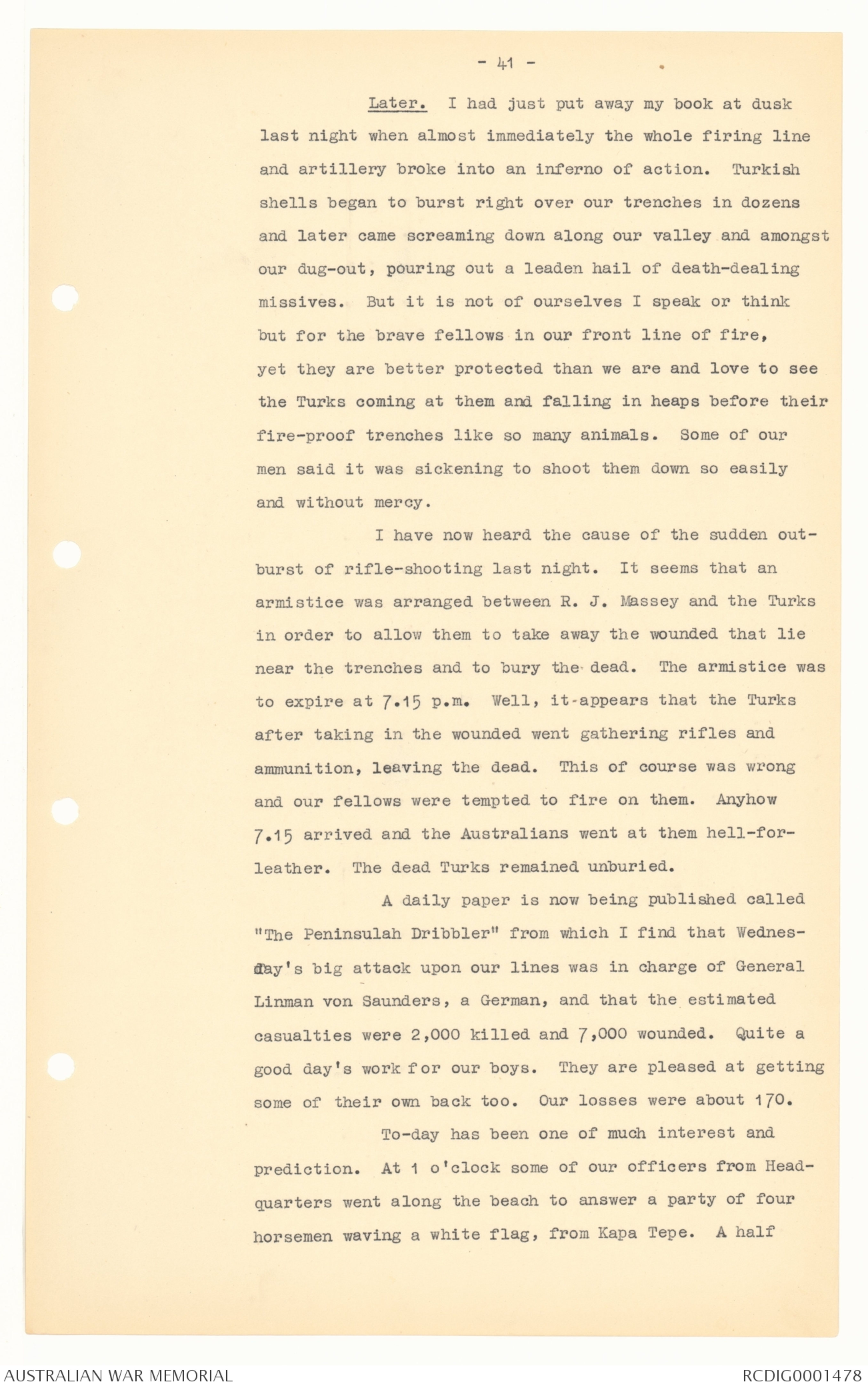
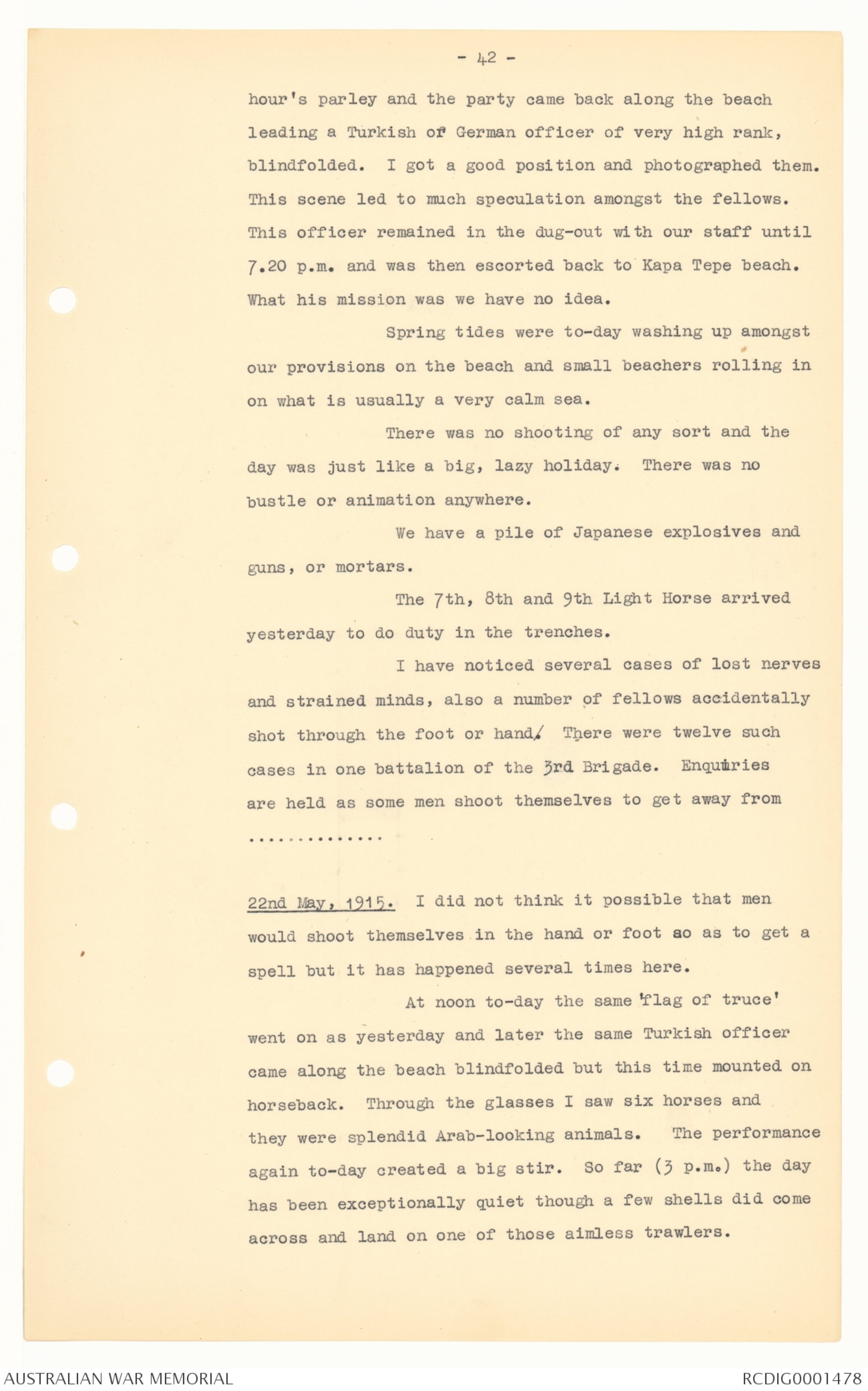
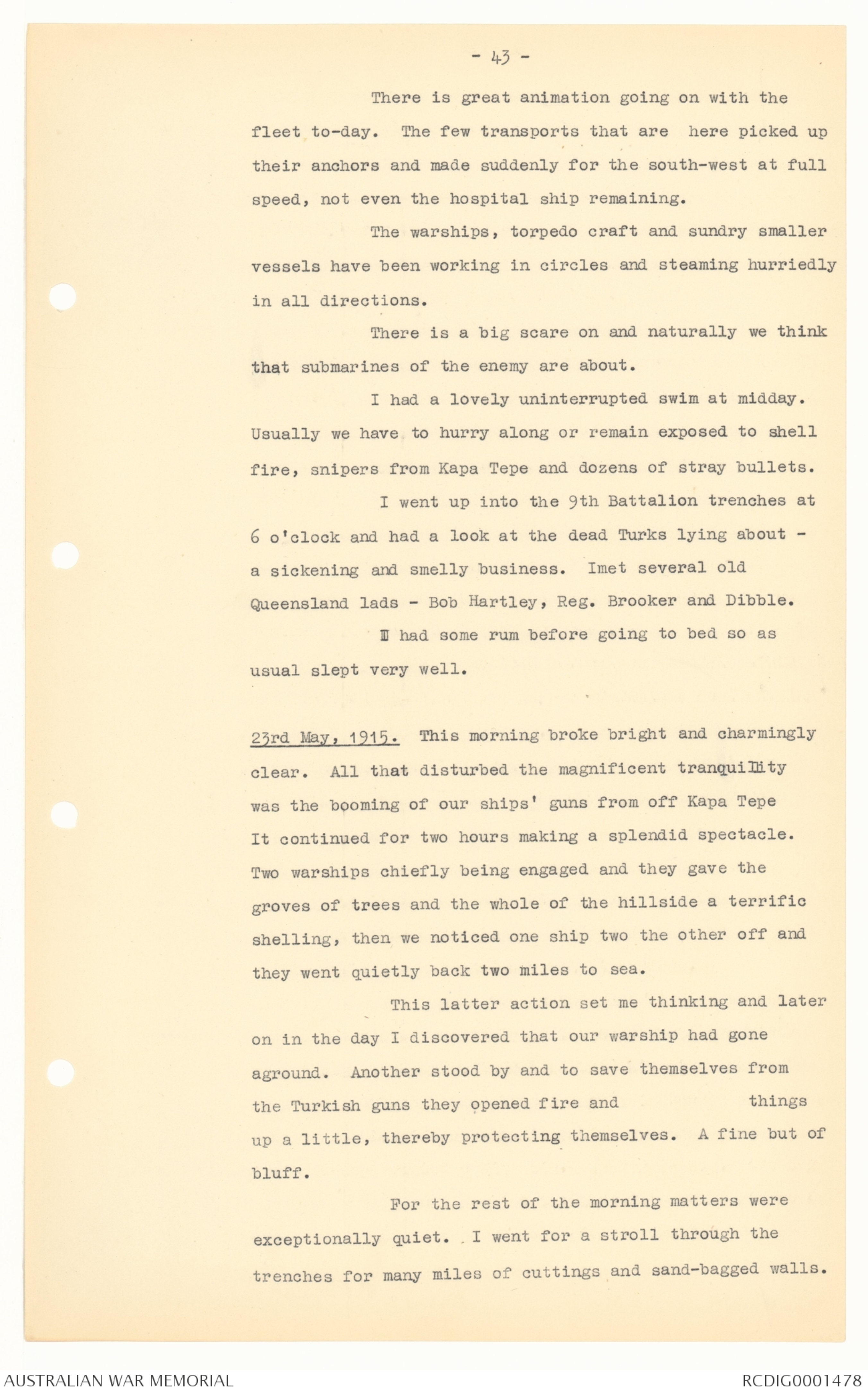
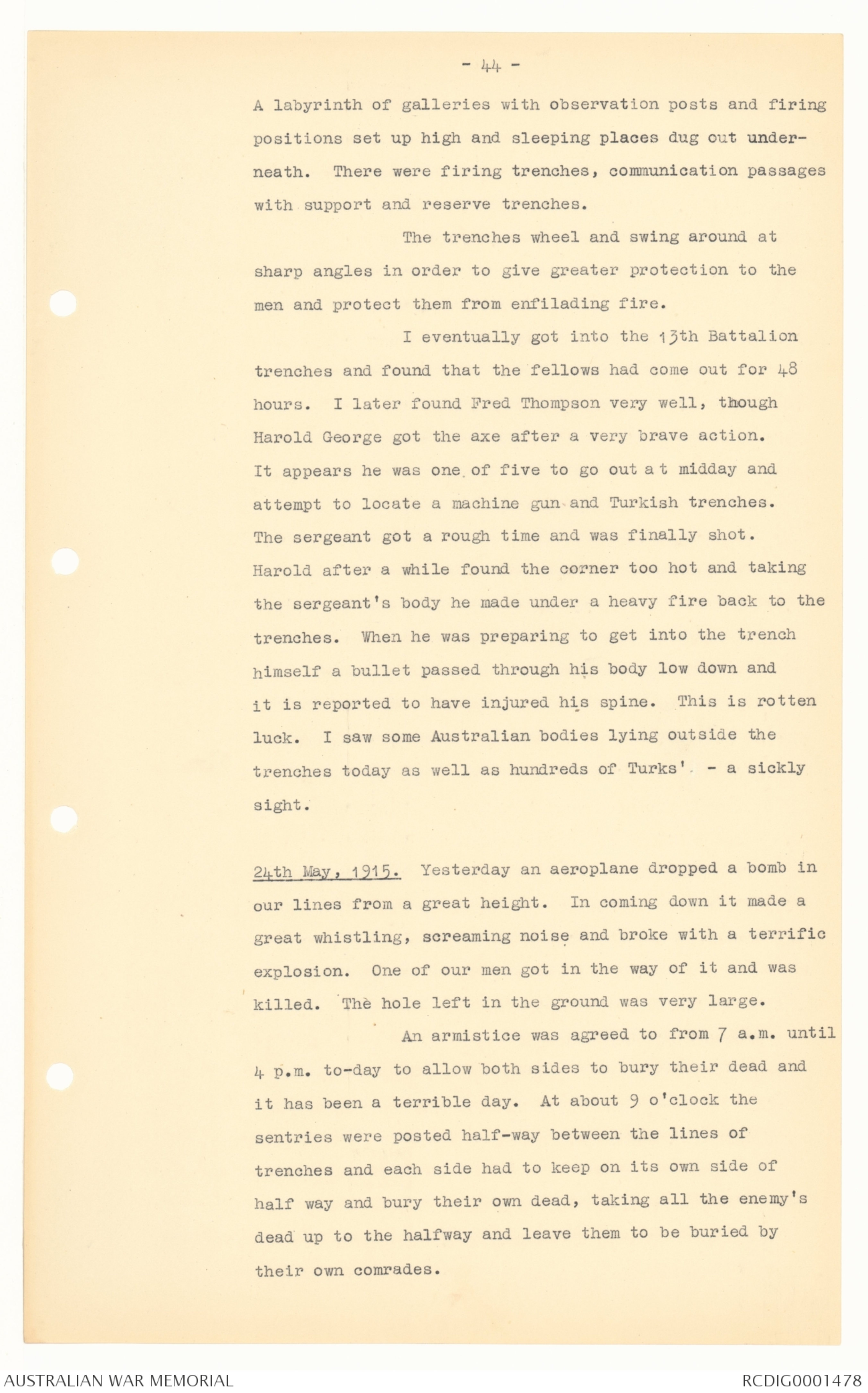
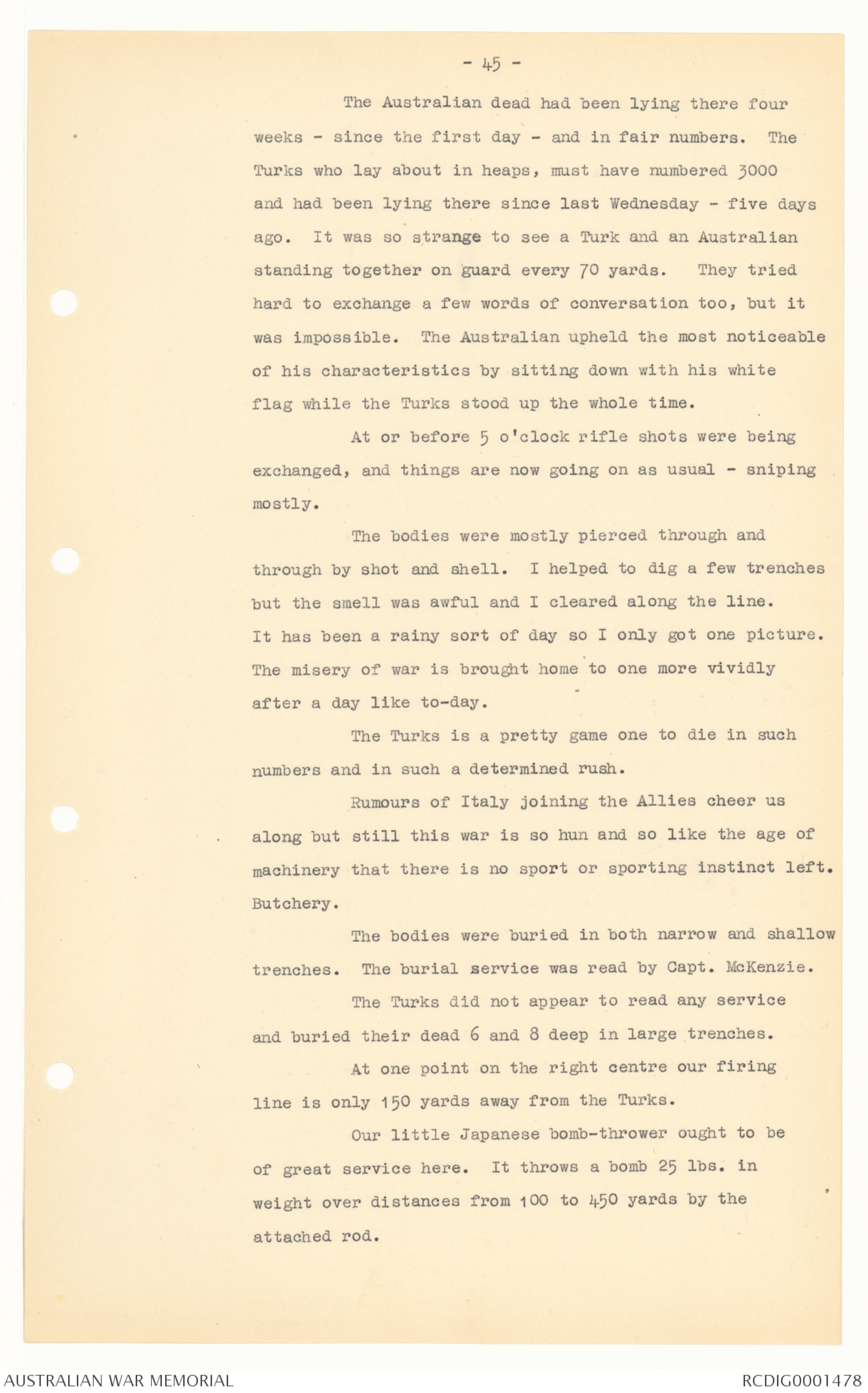
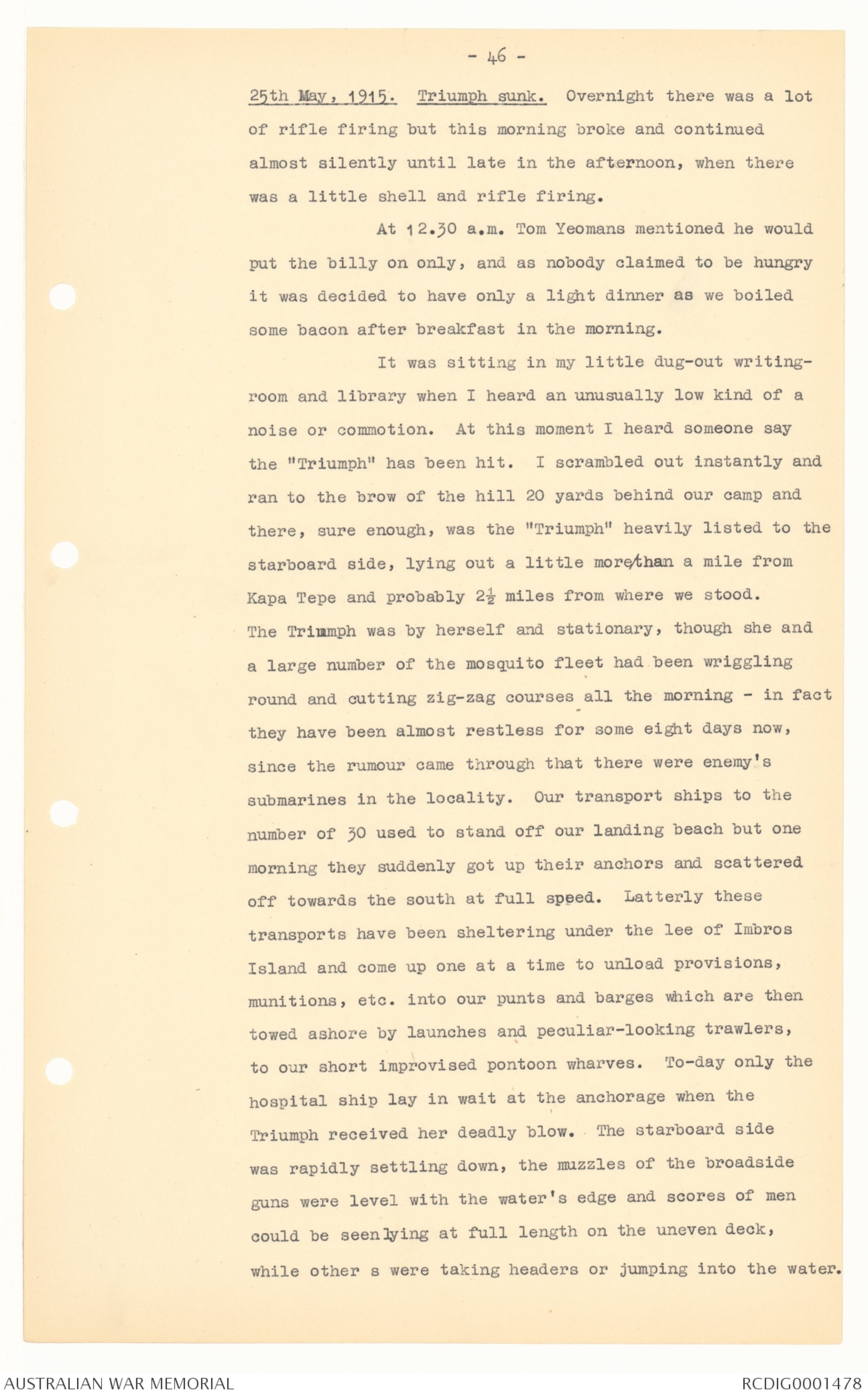
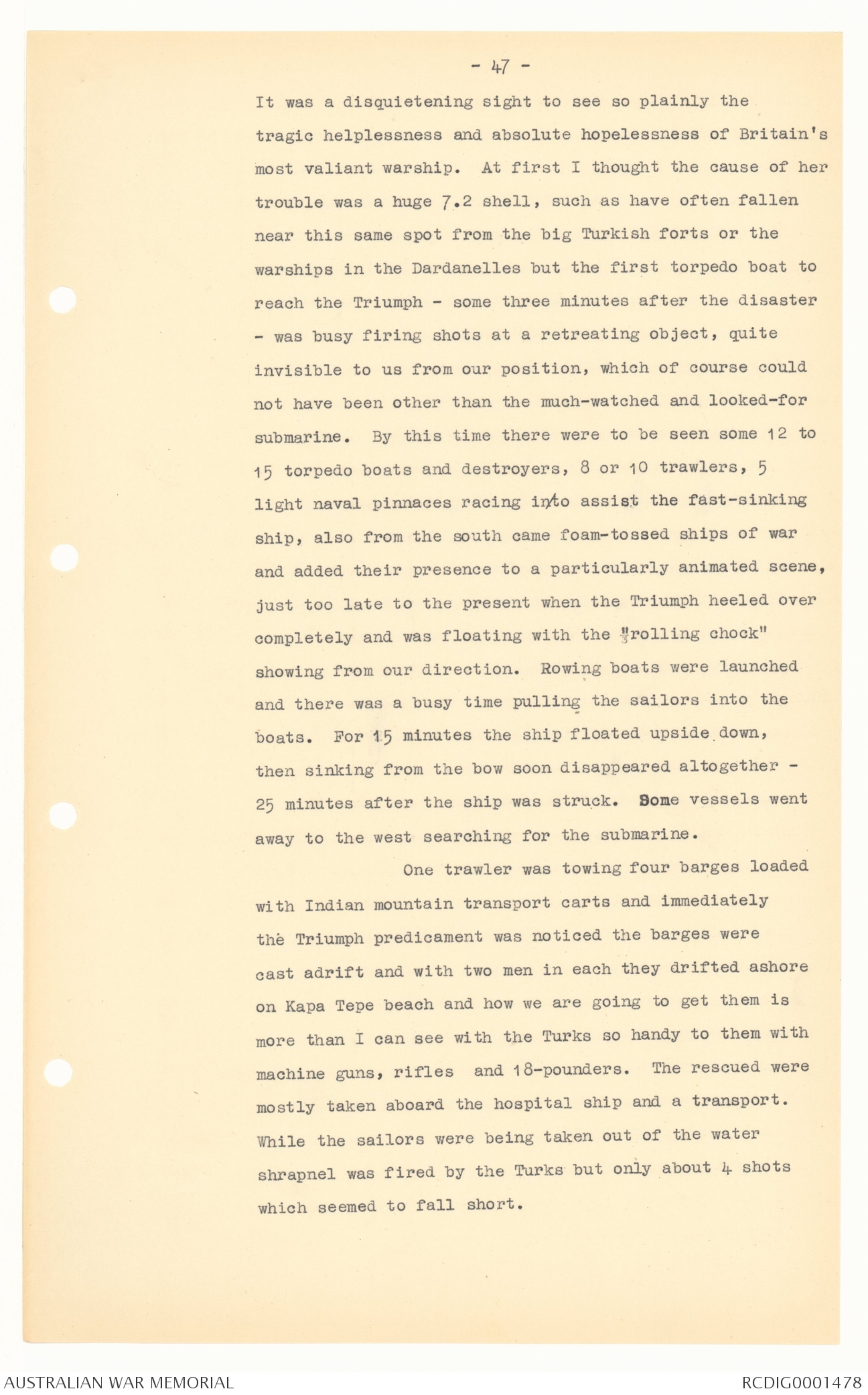
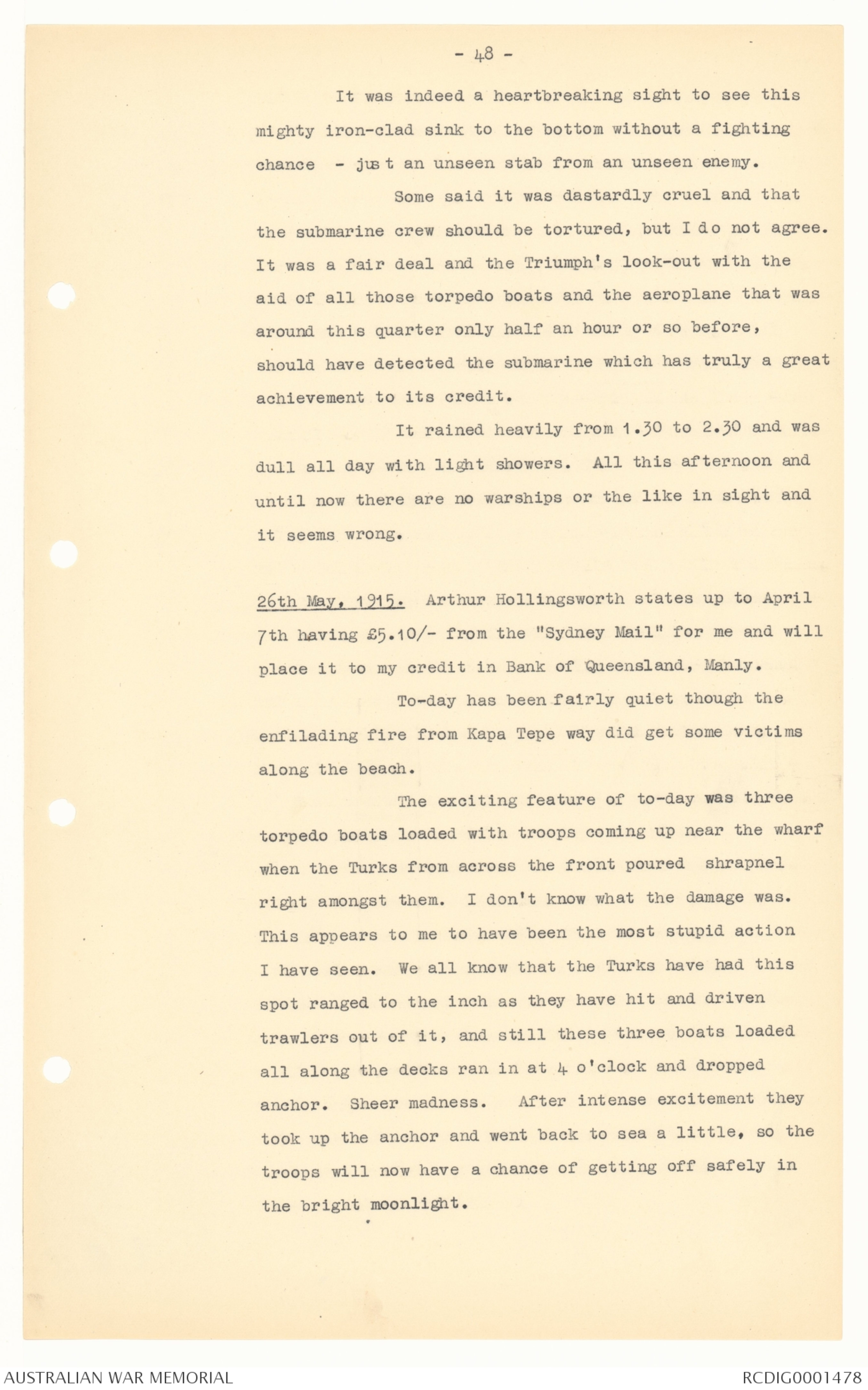
- 39-
The Turks have fired thousands of shrapnel
shells already and are still going. We have squads out
bringing in wounded and it seems a shame. They plug away
the whole time. By the papers I read less bravery than
is now being shown by our stretcher party has been rewarded
by distinction at the European front. Risking one's life
here with us by exposure to fire is mere child's play.
It is at this moment of writing (Thursday) I
have been waiting for news - definite news - of yesterday's
great battle but alas, it is difficult to get hold of
facts. The men in the trenches even differ one from
another to an extraordinary extent. I even went up into
the trenches this morning to see just how many dead Turks
there were lying about and instead of hundreds there were
only a dozen or so. This disappointed me somewhat as I
felt certain that our men had driven off a strong attack
and caused great havoc. Our wounded for the 14 or so hours
treated at the beach hospital were 170, some of them badly
shattered by shrapnel. Australia is going to be crowded
with maimed men after this lot right enough. Yesterday's
battle was no doubt a splendid win for Australia, although
the Turkish artillery does such a lot of damage to us.
Nowhere at all is a man safe from them. The shells enter
deep dug-outs and kill the occupants. Our camp was riddled
with tops of shells and pellets, many narrow escapes being
recorded, but it's marvellous how the fellows exaggerate
their close shaves and lie about things.
I believe our men are averse to taking
prisoners as the tales runs that many parties - one
to-day - with white flag and red cross (Crescent) some forty
strong, come along but our chaps would not trust them and
turned a machine amongst them. This kind of thing does not
give the Turks a chance to surrender as we are told they
really would like to.
- 40 -
I know full well that our boys are showing no
quarter. It's an all-in fight, no "beg your pardons"
with the Australians. They seek revenge!!
20th May, 1915. We had a bit of a rush on last night
until 9 p.m., then No. 8 Squad slept at a dressing station
in case any injured should come along over-night.
At 2 a.m. I walked down with a fellow wounded in
the head and going back in the dark alone to be challenged
and possibly shot at by our own sentries made it a rather
shaky trip. One night the sentry could not have
challenged me very loudly as he came running after me with
bayonet fixed and kept it level with my chest until he
was satisfied. I was no spy. So last night being particularly
dark I was careful to keep my ears opened.
This morning I went over on to the left flank
where things remain much the same with the New Zealanders.
The fields of red poppies make the ground look a bloody
red in patches.
There is a delightful young moon now in the sky.
The weather day and night is much warmer. More troops
are arriving. To-day has been extremely quiet.
21st May, 1915. The 2nd Brigade and a brigade of New
Zealanders have now returned from Cape Helles whither they
were sent from here. Some of them say they were taken
there just to lead the attacks upon the Turkish trenches
for the Englishmen and the French. They have nothing good
to say about the Frenchmen as fighters. Anyhow, they are
now all back with us and very glad too. I have never
heard anybody grumble about fighting and losing men here
with us but all these returned men complain bitterly of
having to fight down south with the Englishmen/and Frenchmen.
"We want to see it out with our own men and for
the honour of our own country" they have expressed it.
- 41 -
Later. I had just put away my book at dusk
last night when almost immediately the whole firing line
and artillery broke into an inferno of action. Turkish
shells began to burst right over our trenches in dozens
and later came screaming down along our valley and amongst
our dug-out, pouring out a leaden hail of death-dealing
missives. But it is not of ourselves I speak or think
but for the brave fellows in our front line of fire,
yet they are better protected than we are and love to see
the Turks coming at them and falling in heaps before their
fire-proof trenches like so many animals. Some of our
men said it was sickening to shoot them down so easily
and without mercy.
I have now heard the cause of the sudden outburst
of rifle-shooting last night. It seems that an
armistice was arranged between R. J. Massey and the Turks
in order to allow them to take away the wounded that lie
near the trenches and to bury the dead. The armistice was
to expire at 7.15 p.m. Well, it-appears that the Turks
after taking in the wounded went gathering rifles and
ammunition, leaving the dead. This of course was wrong
and our fellows were tempted to fire on them. Anyhow
7.15 arrived and the Australians went at them hell-for-leather.
The dead Turks remained unburied.
A daily paper is now being published called
"The Peninsulah Dribbler" from which I find that Wednesday's
big attack upon our lines was in charge of General
Linman von Saunders, a German, and that the estimated
casualties were 2,000 killed and 7,000 wounded. Quite a
good day's work for our boys. They are pleased at getting
some of their own back too. Our losses were about 170.
To-day has been one of much interest and
prediction. At 1 o'clock some of our officers from Headquarters
went along the beach to answer a party of four
horsemen waving a white flag, from Kapa Tepe. A half
- 42 -
hour's parley and the party came back along the beach
leading a Turkish or German officer of very high rank,
blindfolded. I got a good position and photographed them.
This scene led to much speculation amongst the fellows.
This officer remained in the dug-out with our staff until
7.20 p.m. and was then escorted back to Kapa Tepe beach.
What his mission was we have no idea.
Spring tides were to-day washing up amongst
our provisions on the beach and small beachers rolling in
on what is usually a very calm sea.
There was no shooting of any sort and the
day was just like a big, lazy holiday. There was no
bustle or animation anywhere.
We have a pile of Japanese explosives and
guns, or mortars.
The 7th, 8th and 9th Light Horse arrived
yesterday to do duty in the trenches.
I have noticed several cases of lost nerves
and strained minds, also a number of fellows accidentally
shot through the foot or hand./ There were twelve such
cases in one battalion of the 3rd Brigade. Enquiries
are held as some men shoot themselves to get away from
. . . . . . . . . .
22nd May, 1915. I did not think it possible that men
would shoot themselves in the hand or foot so as to get a
spell but it has happened several times here.
At noon to-day the same 'flag of truce'
went on as yesterday and later the same Turkish officer
came along the beach blindfolded but this time mounted on
horseback. Through the glasses I saw six horses and
they were splendid Arab-looking animals. The performance
again to-day created a big stir. So far (3 p.m.) the day
has been exceptionally quiet though a few shells did come
across and land on one of those aimless trawlers.
- 43 -
There is great animation going on with the
fleet to-day. The few transports that are here picked up
their anchors and made suddenly for the south-west at full
speed, not even the hospital ship remaining.
The warships, torpedo craft and sundry smaller
vessels have been working in circles and steaming hurriedly
in all directions.
There is a big scare on and naturally we think
that submarines of the enemy are about.
I had a lovely uninterrupted swim at midday.
Usually we have to hurry along or remain exposed to shell
fire, snipers from Kapa Tepe and dozens of stray bullets.
I went up into the 9th Battalion trenches at
6 o'clock and had a look at the dead Turks lying about -
a sickening and smelly business. Imet several old
Queensland lads - Bob Hartley, Reg. Brooker and Dibble.
I had some rum before going to bed so as
usual slept very well.
23rd May, 1915. This morning broke bright and charmingly
clear. All that disturbed the magnificent tranquillity
was the booming of our ships' guns from off Kapa Tepe
It continued for two hours making a splendid spectacle.
Two warships chiefly being engaged and they gave the
groves of trees and the whole of the hillside a terrific
shelling, then we noticed one ship two the other off and
they went quietly back two miles to sea.
This latter action set me thinking and later
on in the day I discovered that our warship had gone
aground. Another stood by and to save themselves from
the Turkish guns they opened fire and things
up a little, thereby protecting themselves. A fine but of
bluff.
For the rest of the morning matters were
exceptionally quiet. I went for a stroll through the
trenches for many miles of cuttings and sand-bagged walls.
- 44 -
A labyrinth of galleries with observation posts and firing
positions set up high and sleeping places dug out underneath.
There were firing trenches, communication passages
with support and reserve trenches.
The trenches wheel and swing around at
sharp angles in order to give greater protection to the
men and protect them from enfilading fire.
I eventually got into the 13th Battalion
trenches and found that the fellows had come out for 48
hours. I later found Fred Thompson very well, though
Harold George got the axe after a very brave action.
It appears he was one of five to go out at midday and
attempt to locate a machine gun and Turkish trenches.
The sergeant got a rough time and was finally shot.
Harold after a while found the corner too hot and taking
the sergeant's body he made under a heavy fire back to the
trenches. When he was preparing to get into the trench
himself a bullet passed through his body low down and
it is reported to have injured his spine. This is rotten
luck. I saw some Australian bodies lying outside the
trenches today as well as hundreds of Turks'. - a sickly
sight.
24th May, 1915. Yesterday an aeroplane dropped a bomb in
our lines from a great height. In coming down it made a
great whistling, screaming noise and broke with a terrific
explosion. One of our men got in the way of it and was
killed. The hole left in the ground was very large.
An armistice was agreed to from 7 a.m. until
4 p.m. to-day to allow both sides to bury their dead and
it has been a terrible day. At about 9 o'clock the
sentries were posted half-way between the lines of
trenches and each side had to keep on its own side of
half way and bury their own dead, taking all the enemy's
dead up to the halfway and leave them to be buried by
their own comrades.
- 45 -
The Australian dead had been lying there four
weeks - since the first day - and in fair numbers. The
Turks who lay about in heaps, must have numbered 3000
and had been lying there since last Wednesday - five days
ago. It was so strange to see a Turk and an Australian
standing together on guard every 70 yards. They tried
hard to exchange a few words of conversation too, but it
was impossible. The Australian upheld the most noticeable
of his characteristics by sitting down with his white
flag while the Turks stood up the whole time.
At or before 5 o'clock rifle shots were being
exchanged, and things are now going on as usual - sniping
mostly.
The bodies were mostly pierced through and
through by shot and shell. I helped to dig a few trenches
but the smell was awful and I cleared along the line.
It has been a rainy sort of day so I only got one picture.
The misery of war is brought home to one more vividly
after a day like to-day.
The Turks is a pretty game one to die in such
numbers and in such a determined rush.
Rumours of Italy joining the Allies cheer us
along but still this war is so hun and so like the age of
machinery that there is no sport or sporting instinct left.
Butchery.
The bodies were buried in both narrow and shallow
trenches. The burial service was read by Capt. McKenzie.
The Turks did not appear to read any service
and buried their dead 6 and 8 deep in large trenches.
At one point on the right centre our firing
line is only 150 yards away from the Turks.
Our little Japanese bomb-thrower ought to be
of great service here. It throws a bomb 25 lbs. in
weight over distances from 100 to 450 yards by the
attached rod.
- 46-
25th May, 1915. Triumph sunk. Overnight there was a lot
of rifle firing but this morning broke and continued
almost silently until late in the afternoon, when there
was a little shell and rifle firing.
At 12.30 a.m. Tom Yeomans mentioned he would
put the billy on only, and as nobody claimed to be hungry
it was decided to have only a light dinner as we boiled
some bacon after breakfast in the morning.
It was sitting in my little dug-out writingroom
and library when I heard an unusually low kind of a
noise or commotion. At this moment I heard someone say
the "Triumph" has been hit. I scrambled out instantly and
ran to the brow of the hill 20 yards behind our camp and
there, sure enough, was the "Triumph" heavily listed to the
starboard side, lying out a little more/than a mile from
Kapa Tepe and probably 2½ miles from where we stood.
The Triumph was by herself and stationary, though she and
a large number of the mosquito fleet had been wriggling
round and cutting zig-zag courses all the morning - in fact
they have been almost restless for some eight days now,
since the rumour came through that there were enemy's
submarines in the locality. Our transport ships to the
number of 30 used to stand off our landing beach but one
morning they suddenly got up their anchors and scattered
off towards the south at full speed. Latterly these
transports have been sheltering under the lee of Imbros
Island and come up one at a time to unload provisions,
munitions, etc. into our punts and barges which are then
towed ashore by launches and peculiar-looking trawlers,
to our short improvised pontoon wharves. To-day only the
hospital ship lay in wait at the anchorage when the
Triumph received her deadly blow. The starboard side
was rapidly settling down, the muzzles of the broadside
guns were level with the water's edge and scores of men
could be seen lying at full length on the uneven deck,
while other s were taking headers or jumping into the water.
- 47 -
It was a disquietening sight to see so plainly the
tragic helplessness and absolute hopelessness of Britain's
most valiant warship. At first I thought the cause of her
trouble was a huge 7.2 shell, such as have often fallen
near this same spot from the big Turkish forts or the
warships in the Dardanelles but the first torpedo boat to
reach the Triumph - some three minutes after the disaster
- was busy firing shots at a retreating object, quite
invisible to us from our position, which of course could
not have been other than the much-watched and looked-for
submarine. By this time there were to be seen some 12 to
15 torpedo boats and destroyers, 8 or 10 trawlers, 5
light naval pinnaces racing in/to assist the fast-sinking
ship, also from the south came foam-tossed ships of war
and added their presence to a particularly animated scene,
just too late to the present when the Triumph heeled over
completely and was floating with the "rolling chock"
showing from our direction. Rowing boats were launched
and there was a busy time pulling the sailors into the
boats. For 15 minutes the ship floated upside down,
then sinking from the bow soon disappeared altogether -
25 minutes after the ship was struck. Some vessels went
away to the west searching for the submarine.
One trawler was towing four barges loaded
with Indian mountain transport carts and immediately
the Triumph predicament was noticed the barges were
cast adrift and with two men in each they drifted ashore
on Kapa Tepe beach and how we are going to get them is
more than I can see with the Turks so handy to them with
machine guns, rifles and 18-pounders. The rescued were
mostly taken aboard the hospital ship and a transport.
While the sailors were being taken out of the water
shrapnel was fired by the Turks but only about 4 shots
which seemed to fall short.
- 48 -
It was indeed a heartbreaking sight to see this
mighty iron-clad sink to the bottom without a fighting
chance - just an unseen stab from an unseen enemy.
Some said it was dastardly cruel and that
the submarine crew should be tortured, but I do not agree.
It was a fair deal and the Triumph's look-out with the
aid of all those torpedo boats and the aeroplane that was
around this quarter only half an hour or so before,
should have detected the submarine which has truly a great
achievement to its credit.
It rained heavily from 1.30 to 2.30 and was
dull all day with light showers. All this afternoon and
until now there are no warships or the like in sight and
it seems wrong.
26th May, 1915. Arthur Hollingsworth states up to April
7th having £5.10/- from the "Sydney Mail" for me and will
place it to my credit in Bank of Queensland, Manly.
To-day has been fairly quiet though the
enfilading fire from Kapa Tepe way did get some victims
along the beach.
The exciting feature of to-day was three
torpedo boats loaded with troops coming up near the wharf
when the Turks from across the front poured shrapnel
right amongst them. I don’t know what the damage was.
This appears to me to have been the most stupid action
I have seen. We all know that the Turks have had this
spot ranged to the inch as they have hit and driven
trawlers out of it, and still these three boats loaded
all along the decks ran in at 4 o'clock and dropped
anchor. Sheer madness. After intense excitement they
took up the anchor and went back to sea a little, so the
troops will now have a chance of getting off safely in
the bright moonlight.
 Not Yet Replaced By AI
Not Yet Replaced By AIThis transcription item is now locked to you for editing. To release the lock either Save your changes or Cancel.
This lock will be automatically released after 60 minutes of inactivity.